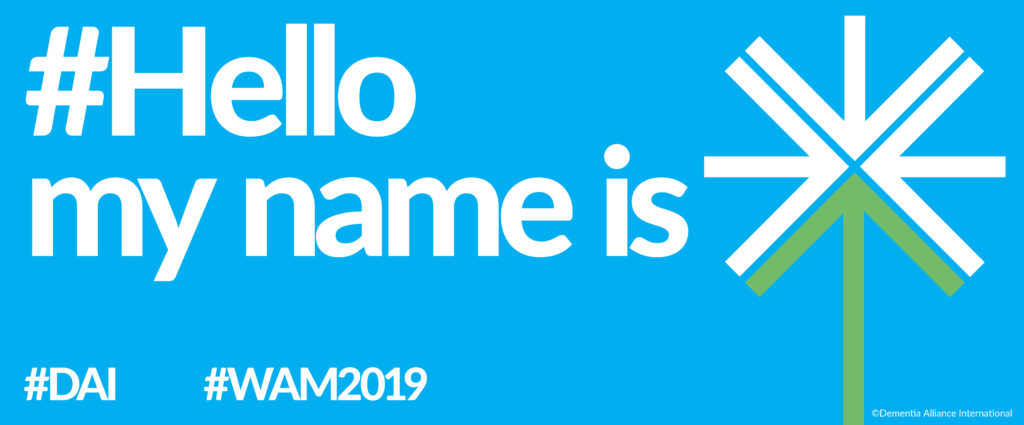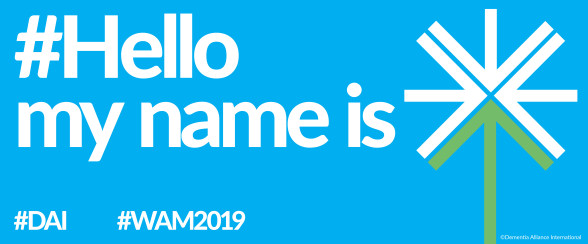 Welcome to World Alzheimer's Month #WAM2019. As we did in 2018, we aim to highlight the voices of our members, and this year, our families. The voices of everyone impacted by dementia matter, and today, we kick off #WAM2019 with co-founder John Sandbloms story of being diagnosed with dementia in 2007.
Welcome to World Alzheimer's Month #WAM2019. As we did in 2018, we aim to highlight the voices of our members, and this year, our families. The voices of everyone impacted by dementia matter, and today, we kick off #WAM2019 with co-founder John Sandbloms story of being diagnosed with dementia in 2007.
Johns personal story of being diagnosed with dementia was first published on his website, and is re-published here with permission. You can read his blogs here...
Early (Young) Onset Atypical Alzheimer's Disease - one person's story.
My name is John Sandblom and I am diagnosed with Young Onset Atypical Alzheimer's Disease. I was first diagnosed at the age of 48 in 2007 with FTD by a gerontologist that specialized in dementia. He was the same physician that diagnosed my father with Alzheimer's Disease in his early 70's. My mother had been saying that my father was "losing it" for many years but I never really understood what she meant and if she was just complaining about normal aging issues with my father. I knew that he had made some very ill advised decisions in his late 40's, 50's and 60's but I once again NEVER thought about the possibility of dementia nor did he ever admit that there was anything wrong with his brain or thinking.
My mother passed away from lung cancer and it was at that time we realized my father had some serious problems with thinking. We moved him in to a retirement community apartment and he managed on his own for a few years. He then began exhibiting serious problems with memory and behavior and it was no longer safe to allow him to drive according to his doctor. I was the only child that lived in the same city so I moved him in with me and we took away his car. This was met with extreme anger but we understood it was the disease and the fact that he never admitted or understood what was happening with him.
I suspect that he had effects from the disease as young as I did but he was self employed so when he made bad decisions it led to one business going under and him starting a new one. His bad decisions all make sense to me now because he had been an extremely successful businessman in his earlier years.After a couple of years living with me it was no longer safe to leave him home alone because he had nearly caught the house on fire and had flooded an upstairs bathroom because he forgot he left the water running. We got him placed in what was considered the best memory care unit in the area.
Fast forward to October of 2007. I had been on short term disability from work labeled with depression (I knew I wasn't depressed but also knew something was wrong so whatever allowed me to be off work was OK) when my wife went against advice from others and called the physician's office that had diagnosed my father. I went through many scans including a PET scan and neuropsych tests. The physician decided I had FTD. I was put on long term disability and applied for Social Security Disability. After an appeal the Social Security Disability was approved.
My wife and I started going to a support group that is provided by The Alzheimer's Association, an organization I highly recommend for anyone with any type of dementia and their caregivers. At this point I took that doctor's word that I had FTD. After a little over a year I began to ask questions that he didn't have answers for because I was not progressing as he expected. He became angry with me and I left his office that day thinking no one should EVER be treated that way by a health care provider. I had asked a friend I had made through the FTD Support Forum about getting in to see her doctor at Mayo Clinic in Rochester MN whose name is Dr. Bradley Boeve and is world renown in the dementia field.
He is a cognitive neurologist specializing in dementia which is what I highly encourage anyone that wants to be evaluated to seek out. I got an appointment with Dr Boeve but it would be 5 months before I could make it to Rochester, MN for a week that worked with my wife's schedule and his schedule. He is the chair of his department and has substantial amounts of his schedule blocked out for research and teaching. He started from scratch and put me through an unbelievable amount of tests assuming nothing. They even repeated my PET scan.
By Thursday of that week he met with me and told me it was medically undeniable that I had a neurodegeneratve brain disease (dementia) but the question was which one? My scans did not match up to anything they normally see as the majority of the damage at that point was in an area described to me like a junction box for all the things the brain does and where executive function is controlled. This explained why I seemed fairly normal but could no longer be successful at work and had problems with things like time management. I could no longer multitask very well at all. But when most of your problems are all about executive function most people think there is nothing wrong with you. In my case I knew something was horribly wrong.
This was never in question for me. In fact, a couple of years before I was ever diagnosed I had an episode that I still can't really explain but I got scared that I had Alzheimer's Disease so I told my family doctor that which was met with "don't be silly, you don't have Alzheimer's Disease". It really wasn't his fault, most people wouldn't have had that thought in the first place let alone suggest it to their doctor at age 46. And it highlights a very big problem in healthcare today, training general practice, family practice, psychiatrists and internal medicine doctors on when to refer to a cognitive neurologist for evaluation of early onset dementia. Dr. Boeve told me it is his experience that a patient is usually correct. So if someone tells their doctor that dementia is a fear they should always be evaluated properly.
A while before I went to Mayo Clinic I met a local cognitive neurologist that specialized in dementia and was fairly new to the area. She seemed like a very good person and a very knowledgeable doctor so I made an appointment with her. She held off doing any tests because she knew Mayo would want to do a lot of their own. Her name is Heike Schmolck, M.D. and I highly recommend her to anyone in Central Iowa who needs a specialist in dementia. After the findings at Mayo she agreed with those and felt like it was most likely that I had atypical FTD.
So I lived with that idea until early November of 2011. My father had passed away from complications from his dementia in the spring of 2010. I immediately contacted NCRAD about donating his brain for research. I was told at the time that I would never gain any knowledge from this donation, that it's only purpose was for research which I want to support in every way I can so that hopefully my children and grandchildren will not have a chance of the same fate. Dr. Boeve had told me and my local doctor agreed that I had the same thing my father had suffered from and that there most likely is a genetic connection meaning any of my offspring would face a 50/50 chance of getting the disease themselves. In early November of 2011 I received the full autopsy report on my father's brain. To my shock and the shock of my neurologist it showed he had Alzheimer's Disease. That led to changing my diagnosis to Early Onset Atypical Alzheimer's Disease (frontal variant).
It is very scary for anyone with dementia to think about the distant future. To think about that is to admit what we will be reduced to and how hard it will be on those that love us. So I chose to concentrate on what I can still do to feel useful and feel like I am giving back in some way. I do volunteer work for my local chapter of The Alzheimer's Association. I have been to the National Forum in Washington D.C. three years in a row (2010,2011 & 2012) to visit with our congressional representatives about issues important to those that suffer from dementia. I feel it is my obligation to do whatever I can while I still can to help all those that suffer and in memory of those that have suffered like my father. I stay very upbeat and not above making a joke about my condition on a regular basis.
I don't take it lightly but like someone once said, in situations like this you can laugh or cry and I prefer to laugh.
Whether you are new to dementia or this is not a new subject for you, I highly recommend The Alzheimer's Association for resources in your area and a lot more. When you go to the national website that is linked, you will find in the upper right hand corner there is a place where you can enter your zip code to find out where your nearest chapter is located. These people are always happy to meet with you or talk on the phone and help in any way they can! The association is also the largest private source of research funds for dementia in the world. If you can afford it, please donate to them! I also encourage anyone with dementia to contact NCRAD to see how you can help further research. I donated blood along with donating my father's brain.
Are you or someone you know diagnosed with Alzheimer's or a related disease? Would you like support from others that are diagnosed? If so direct them to to sign up for FREE membership and many support options.
